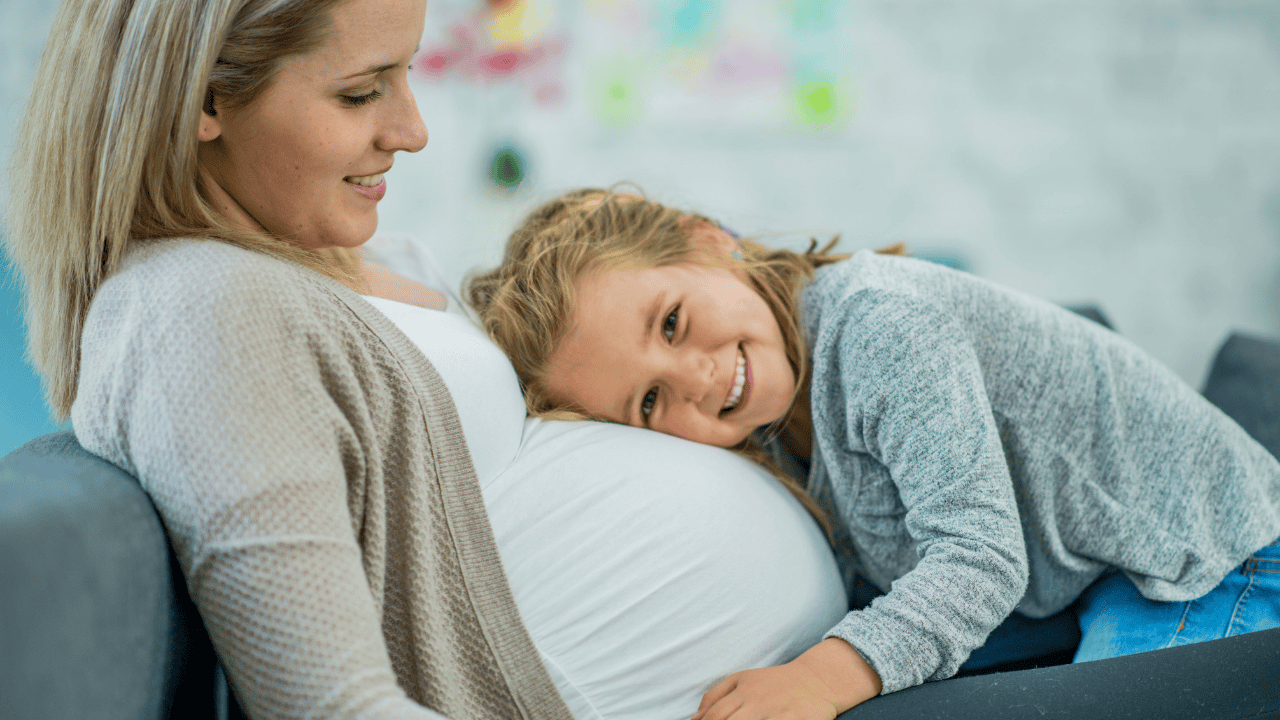 | About the Author Melissa Weekes is a Product Development Specialist. Prior to joining Great Kids® in 2018, she worked as a home visitor with Public Health Services where she used the Growing Great Kids® Curriculum. Melissa lives in Nova Scotia, Canada, with her husband and enjoys any opportunity to be creative! |
I was five when my mom was expecting my brother. I have this vivid memory of her being heavily pregnant and perched on the edge of the sofa, reading me a story. I guess my brother was enjoying the story, too, as he gave my mom a surprising kick, which startled her, making her lose her balance and tumble to the floor. Thankfully, she wasn’t hurt, and we both laughed.
Who was this little person about to invade my world, anyway? Little did I know! Many years later, I can’t imagine life without him…or my other siblings.
Defining Prenatal Attachment
Perhaps you’ll agree that it can be a profound experience to touch a loved one’s pregnant belly and feel a baby move. Or see a tiny hand or foot push up from the inside as if to say, “Hey! I’m here, and I can’t wait to meet you!”
These brief encounters spark awe and wonder as I imagine who this new little person is and what they’ll be like.
Will they have their parent’s curly hair or their grandparent’s fiery personality?
What gifts will they share with the world, and who will they become?
What’s neat is, if you’re a parent expecting a baby, these kinds of ponderings can be the beginning of growing a relationship or bond with your baby.3,4,7
Researchers call this developing connection “prenatal attachment.”6,10 The experts say that all parents can grow a bond with their baby, and the bond can look different for each parent.5,6,7
If you’re expecting a new baby, know that every moment you spend:
- imagining their future,
- planning for their arrival,
- and caring for your own well-being,
is a step closer to deepening your connection with them.1,2,3,4,6,7,9 These early interactions, whether through touch, voice, or love-filled anticipation, begin to form the foundation of a lifetime bond.1,3,6,9
The Benefits of Early Bonding
Babies can sense love, and I was intrigued to learn that early bonding experiences become stored in the cells of their developing bodies as first impressions or “memories.”1,6,9
For example, studies have shown that newborns recognize and prefer their parent’s voice and remember tunes heard during pregnancy.7 In the story I shared about my mom reading to me, perhaps my brother felt a sense of connection and belonging in that moment.
These moments of connection during pregnancy can support a baby’s physical and emotional development and strengthen the parent-child relationship beyond birth.1,6,7,9 When expecting a baby, nurturing this bond can also be a source of strength, offering mental health benefits and inspiring positive life choices.2,6,8,9
Support For Expecting Parents
At Great Kids, we’re dedicated to supporting early connections through our values, mission, and products, and we couldn’t be more excited for the launch of our Growing Great Kids Next Generation Prenatal manual!
Unlike a regular pregnancy, the development of this product has taken a little longer than nine months, and all the wondering is finally over! I hope that just like the arrival of a new baby, you’ll have the pleasure of discovering the unique gift they are, and you’ll feel richer for knowing them.
When you purchase GGK P-36, you will get our enhanced prenatal curriculum included in the set! Enjoy having the latest research and resources to facilitate attachment bonding!
Learn more about GGK Next Generation Prenatal – 36 Months curriculum!
References
1. Ertmann, R. K., Bang, C. W., Kriegbaum, M., Væver, M. S., Kragstrup, J., Siersma, V., Wilson, P., Lutterodt, M. C., & Smith-Nielsen, J. (2021). What factors are most important for the development of the maternal-fetal relationship? A prospective study among pregnant women in Danish general practice. BMC Psychology, 9(1), 2. https://doi.org/10.1186/s40359-020-00499-x
2. Foley, S., Hughes, C., Murray, A. L., Baban, A., Fernando, A. D., Madrid, B., Osafo, J., Sikander, S., Abbasi, F., Walker, S., Van, T. V., Luong-Thanh, B. Y., Tomlinson, M., Fearon, P., Ward, C. L., Valdebenito, S., & Eisner, M. (2021). Prenatal attachment: Using measurement invariance to test the validity of comparisons across eight culturally diverse countries. Archives of Women’s Mental Health, 24, 619–625. https://doi.org/10.1007/s00737-021-01105-8
3. Kinsner, K. (2019, March 24). Bonding with your baby before birth. Zero To Three. https://www.zerotothree.org/resource/bonding-with-your-baby-before-birth/
4. MacLaughlin, S. S. (2017, June 9). Who will this child be? Zero To Three. https://www.zerotothree.org/resource/who-will-this-child-be/
5. Mazza, M., Kotzalidis, G. D., Avallone, C., Balocchi, M., Sessa, I., De Luca, I., Hirsch, D., Simonetti, A., Janiri, D., Loi, E., Marano, G., Albano, G., Fasulo, V., Borghi, S., del Castillo, A. G., Serio, A. M., Monti, L., Chieffo, D., Angeletti, G., . . . Sani, G. (2022). Depressive symptoms in expecting fathers: Is paternal perinatal depression a valid concept? A systematic review of evidence. Journal of Personalized Medicine, 12(10), 1598. https://doi.org/10.3390/jpm12101598
6. Rollè, L., Giordano, M., Santoniccolo, F., & Trombetta, T. (2020). Prenatal attachment and perinatal depression: A systematic review. International Journal of Environmental Research and Public Health, 17(8), 2644. https://doi.org/10.3390/ijerph17082644
7. Scorza, P., & Monk, C. (2019). Anticipating the stork: Stress and trauma during pregnancy and the importance of prenatal parenting. ZERO TO THREE Journal, 39(5), 5–13. https://www.zerotothree.org/resource/journal/anticipating-the-stork-stress-and-trauma-during-pregnancy-and-the-importance-of-prenatal-parenting/
8. Smorti, M., Ponti, L., Ghinassi, S., & Rapisardi, G. (2020). The mother-child attachment bond before and after birth: The role of maternal perception of traumatic childbirth. Early Human Development, 142, 104956. https://doi.org/10.1016/j.earlhumdev.2020.104956
9. Trombetta, T., Giordano, M., Santoniccolo, F., Vismara, L., Della Vedova, A. M., & Rollè, L. (2021). Pre-natal attachment and parent-to-infant attachment: A systematic review. Frontiers in Psychology, 12, 620942. https://doi.org/10.3389/fpsyg.2021.620942


